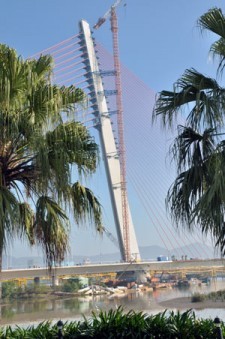
When it comes to Vietnam becoming a more competitive destination for investment in the region and achieving its full economic potential, the answer from Truong Quang Hung is clear: "People talk about different issues, but to me, improving infrastructure is vital at this stage of our development."
In Hung's case, the focus is on public-private-partnership (PPP), as he has been tasked to help implement a national plan to encourage infrastructure projects under PPPs. With a graduate degree from Hanoi Transport University and several years of hands-on experiences monitoring transport projects at the ministerial level, he is now a senior officer working within the PPP Office under the Ministry of Planning and Investment (MPI) - a one-stop-shop division in charge of national coordination of PPP projects.
PPP is a long-term contractual relationship between the public sector and a private sector party for the design, construction, financing and/or operation of public infrastructure by the private sector, with payments made over the life of the contract through services fees paid by the users to the private sector party for the use of the infrastructure delivered. In the end, the primary purpose of a PPP is for the public sector to transfer project related risk to a private sector party that is in a better position to manage such risks.
Over the past few years, USAID's Vietnam Competitiveness Initiative (USAID/VNCI) has been supporting the MPI in its efforts to develop a government wide PPP program. Activities have included study tours to other nations that have successfully implemented PPP programs, workshops with key stakeholders to build their consensus on PPP related issues, as well as technical assistance to help build capacity in central government, provincial and city agencies that will implement PPP projects. Currently, implementation of PPP projects follows an ever evolving Decision 71/2010/QD-TTg that focuses on harmonizing potential PPP investor and Vietnamese state interests. The MPI is in the process of supporting provinces and the central government in implementing PPP projects such as e-Government Procurement, wastewater treatment, roads and inland ports.
Vietnam's rapid growth has outpaced its infrastructure, creating a major constraint to continued export-led growth and investment. An estimated $200 billion in new roads, bridges, ports, water sanitation, power, and other infrastructure is required to sustain growth between now and 2020. Hung knows that the Vietnamese Government cannot fully finance this investment through its state budget or official development assistance loans, and that PPPs offer a new alternative.
"It is not only that the private sector can bring financial resource, but also that they can bring the know-how and expertise need to support infrastructure projects led by the Government," he said, noting that Vietnam could learn from the well-developed markets for PPPs in Asian countries such as India, Korea, and Singapore.
He believes that for the country to be successful in adopting PPPs as an option for implementing its infrastructure needs, there must be three elements in play and he's working very hard to address these elements. "Firstly, strong sponsorship of PPP as a policy by the relevant authorities, secondly the development of a legislative framework which is stable and allows for a fair and transparent procurement processes and thirdly capacity development of frontline staff like us," he said.
Despite Vietnam's great potential for PPP development, Hung knows that significant challenges lie ahead. "International firms are eying opportunities for PPP projects in Vietnam, but they will only participate in these projects until a strong and transparent legal framework is in place," said Hung.
The efforts of Hung and his colleagues are supported by a technical team from USAID/VNCI.
"Having a few competent experts behind us has been hugely beneficial," he said. "On the one hand it helps to connect us to relevant international experiences, on the other it also enhances our capacity, and these are great things."
PPPs are still at a very early stage of development in Vietnam and one of the keys to success will be the private sector's active role throughout the development of the PPP program.
The Government of Vietnam recently created a PPP office and inter-ministerial steering committee, and a critical $20 million Project Development Facility and a Viability Gap Fund is slated to be implemented by the end of 2015 that is expected provide up to $1 billion of state contribution required to make PPP projects.







Comment
Make a general inquiry or suggest an improvement.